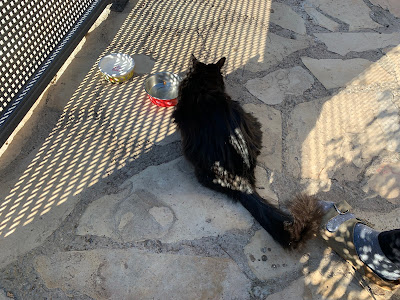In case you’re on tenterhooks to find out how things are going with the peripatetic pet I’ve already talked about here, I thought it only fair to bring you up to date on what’s been happening in the life of Sooty, our occasional cat. Not that Sooty’s only occasionally a cat, you understand, just only occasionally ours.
And not even that anymore.
As a bonus, I’m going to tell you about another member of the peripatetic community around here, Nameless the dog. Who is no longer nameless.
Sooty first. She came back again after the last incident I talked about, and we took to keeping a bowl of water outside for her, together with a bowl that we’d fill with cat food when she showed up. At other times we left it empty, because our own cat, our dog Luci and, above all, the rascally other dog Toffee, would certainly leave it empty if it weren’t empty already.
 |
| When Sooty came back to see us again |
We would have been happy to take her in, but we have a daughter-in-law and a daughter-out-law both of whom suffer from allergies. It’s bad enough exposing them to one cat already, plus the two dogs, without making things still worse by adding a second cat to our menagerie.
But then we got to chatting about all this with our neighbours and good friends Maria José and Santi.
“We’d take her in and keep her,” they said.
They’ve been as good as their word. A couple of days later, they spotted Sooty in the street near their house and tempted her into their home with cat food, just as I had done. But they went a step further and opened their front door too. In shot Sooty. She shows no sign of wanting to leave again anytime soon. Indeed, she reacts with suspicion if they try to get her out into the garden. It seems she’s afraid to find herself abandoned outside again and unable to get back in to the food.
Or the warmth.
One of the things they did was take her to the vets for all the standard shots and things. There’s fortunately not anti-vaxxer movement among cats. I suspect their attitude would be, “Bill Gates wants to control me? He’s welcome to try. But just as long as there’s a full bowl in it for me, I don’t care anyway.”
One of the things that the vet confirmed is that, as I’d feared, we’d got Sooty’s gender wrong. She’s actually a he. So please re-read all of the above with the pronouns correctly adjusted.
Meanwhile, we had another visit from a peripatetic. Again, someone we first met last year, when she attached herself to my two dogs when I was taking them out for a walk. She followed us all the way around a fairly long circuit in the woods and then, like Sooty, came back to our house to be fed. We were quite concerned about her owner – apologies, her human – and rang the number on the medallion on her collar. He seemed pretty relaxed about it all. His daughter came around later to collect the dog, apologising for leaving her with us so long (which wasn’t a hardship: she was lovely). She then made me feel guilty by telling us that her father had no legs.
That turns out to mean that he’s in a wheelchair. We’ve seen him since. He has legs, he just can’t (sadly) walk on them.
We also saw the dog a few times afterwards. By then, though, we’d lost any compulsion to ring him. Clearly, they couldn't fence their garden sufficiently well to prevent her getting out when she felt like going visiting. But if they weren’t worried, why should we be?
Then she disappeared, however, and when I asked, we learned that she was living with one of the daughters (possibly not the one we met). We were a bit sorry. We’d had fun playing with her.
But then, just a week ago, she reappeared. In the same way. Attaching herself to a walk by our dogs, only this time while they were out with Danielle. She came to our place afterwards and we enjoyed her company again for a few hours. It was just like old days. And afterwards we took her around to her actual home, so everything worked out just fine.
Behold the nameless one
and tremble?
I’d decided we ought to give her the name ‘Nameless’, because that’s the kind of thing that amuses me. It turns out that her real name is ‘Puza’, so I’ll have to learn to call her that. But at least, with her, I don’t have to change any pronouns: short-haired as she is, it was far easier than with Sooty to get her gender right.
Later, I called in on Maria José and Santi to see how Sooty was getting on. He was just fine, I’m glad to say, and fully settled into his new place (note the correct pronouns). If anything, he seemed a little stand-offish towards me, keeping at a certain distance most of the time and only occasionally letting me stroke him. Now that he’s no longer begging for food, and instead is worried about being locked out in the cold again, I totally get why he doesn’t want to run any risks with an outsider, even an old friend like me.
I respect that.
 |
| Sooty with Maria José and eying me balefully, as a possible intruder |
They’ve renamed him Suerte. Which is perfect. It’s close enough to Sooty for that to be his nickname. Besides, Suerte means Luck, which is highly appropriate.
After all, he’s fallen on his feet, hasn’t he?
Luckily.

















